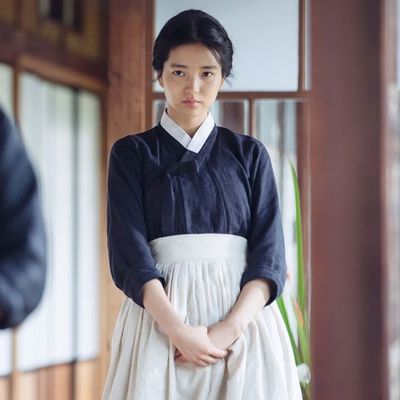
The Korean provocateur Park Chan-wook would be the last director I’d have figured would make a lush, romantic, crowd-pleasing melodrama like The Handmaiden, which he adapted from Fingersmith (2002), by the Welsh novelist Sarah Waters. Park is the auteur behind some critically lauded and exceedingly cruel quasi-horror films, among them Sympathy for Mr. Vengeance, Oldboy, Lady Vengeance, and the English-language Stoker. I was one of the lauders and feel ambivalent about that now. Over time, the director’s nihilism has begun to seem reflexive, his shocks coming for shock’s sake. Thirst and Stoker played like the work of an aging punk gouging himself onstage in an effort to look young, a kind of anti-plastic surgery. But the formal constraints of The Handmaiden do wonders for him. The surface is classical, while Park’s perversity bubbles up from beneath.
Park has shifted the story’s setting from Victorian England to Korea in the 1930s, a time when the country was under Japanese occupation. That’s crucial, because the main characters — all Korean — are either pretending to be Japanese or, out of a wish to rise in society, embracing Japanese culture. Different-colored subtitles help us non-Asian-language speakers follow as the dialogue switches between Japanese and Korean: different languages, different personas, different ways of styling oneself.
The title character, Sookee (Kim Tae-ri), is a fraud. She has been enlisted by Count Fujiwara (Ha Jung-woo), who is neither a count nor, as his name would suggest, Japanese. He’s a Korean con artist with a scheme to marry the niece of a rich Korean book dealer, commit the girl to an asylum, then take off with her sizable inheritance. Sookee is meant to serve the lady, Hideko (Kim Min-hee), and push her into the arms of the devilishly handsome bogus count.
So far, so simple. But The Handmaiden is told in three chapters, each from a different point of view, and each of them fills in gaps we’ve missed in the previous go-round. I found the first chapter beautiful but slow, a bit of a narcotic. It’s when the twists began and then the twists on the twists that I started to get excited.
There’s little romantic chemistry between the fake count and Lady Hideko, and even less between him and the handmaiden, Sookee — they loathe each other. But, wow, are there sparks between the women. Hideko is very young and, as we come to realize, much abused by the uncle who raised her. He trained her harshly in Japanese manners and exposed her to the sadomasochistic pageants staged for guests. He’s a freak. Sookee becomes Hideko’s only confidante — a sister, then a lover.
Their sex scenes are also twisty — figuratively and literally. Figuratively, because Sookee’s loyalties are obviously confused, literally because the women go at it like a couple of octopuses. Their natural passions seem to be breaking through the nasty stratagems and the rule of cruel men.
Park still has his punkish spirit, only it’s channeled here with un-punkish discipline and style. The Handmaiden is a little like that demonic uncle’s house, a riot of Western and Japanese architecture that somehow gels. The shoji screens create what look like puppet stages within puppet stages on which the characters play their parts. The sweeping score by Jo Yeong-wook is indispensable to the mood. It turns the movie’s undercurrents into crashing waves of melody.
The violence is spare, practically nonexistent, but the emotional violence is always palpable, thanks in part to female leads who seem exquisitely sensitive to each other’s presence. I still don’t know how a gore-meister like Park Chan-wook could have made the year’s most irresistible romance. Maybe it’s that he hates oppression — chauvinist, colonialist, Sadean — so deeply that in hoisting his old boys on their own petards, he has discovered the wellsprings of love.


